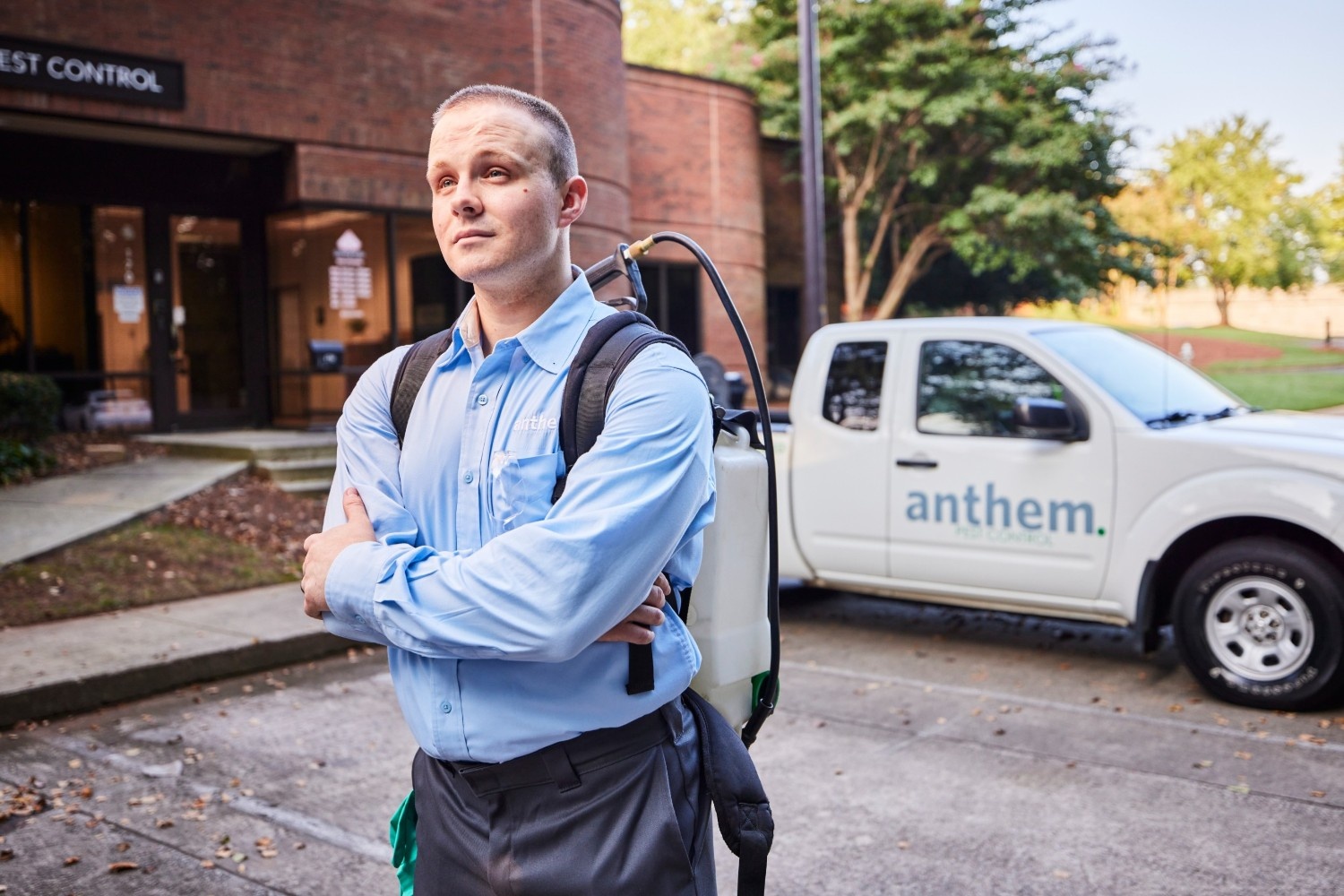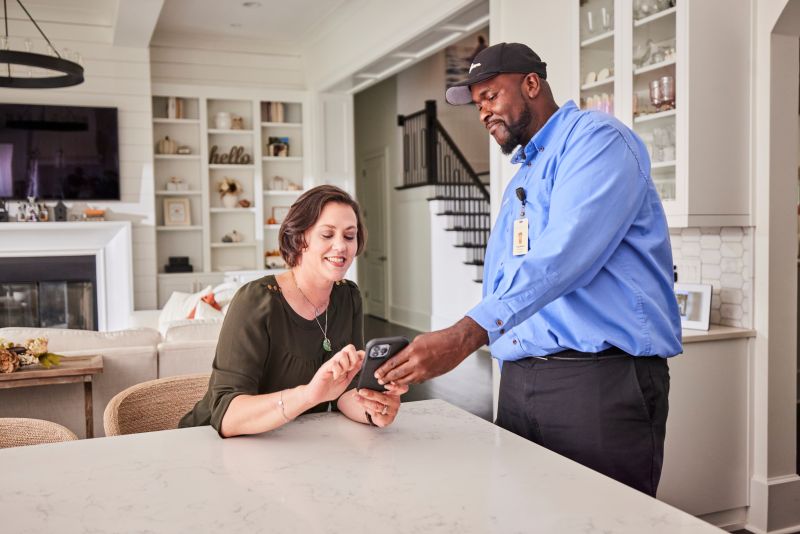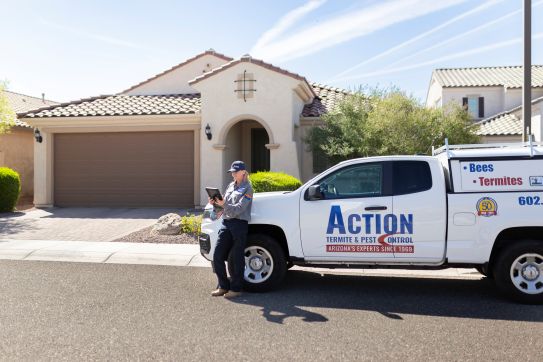20 Pest Control Interview Questions & Sample Answers

Hiring in the pest control industry can be challenging, whether you’re a small pest control business owner handling recruitment yourself or a larger company preparing for peak season.
Asking the right pest control technician interview questions helps you quickly evaluate a candidate’s technical skills, safety protocols, and customer service abilities.
This guide provides 20 essential interview questions, along with sample answers, to help hiring managers identify qualified, adaptable candidates who can effectively address common pest issues and deliver exceptional pest control services.
Technical Job Interview Questions
Though it covers some of the most common interview questions, the technical portion of a job interview is a vital part of the process. It helps you assess how well a candidate’s experience level aligns with your pest control job description.
1. What types of pests have you most commonly dealt with?
Why you should ask this question: This one is straightforward. It helps you assess how much direct experience a candidate has with the pests your company deals with.
Likewise, it indicates whether they have relevant experience that could be applicable. Most importantly, it reveals how much experience an applicant has versus what their resume says.
Example of a good answer:
“I grew up on a farm in Georgia, so we had everything from fire ants to wild hogs. We had to deal with pests right away, usually just me and my dad, because it threatened our livelihood. That made me really good at dealing with things that sting and bite, the stuff most people don’t want to get near.”
The interviewee names the main types of pests they’ve dealt with and offers the context behind them. That context reveals they act with a sense of urgency and provides a glimpse into how they solve problems under pressure.
2. Can you describe the process you would follow to identify and assess a pest infestation in a residential property?
Why you should ask this question: Good technical skills flow from good problem-solving skills, and good problem-solving flows from having a reliable process to break down challenging situations.
After all, part of what makes pest control challenging is that some jobs may look similar but are wildly dissimilar. A torn-up lawn requires a different approach depending on whether it’s a mole, vole, gopher, or other pest doing the damage.
Example of a good answer:
“I start at the crime scene and work my way from there. Do I see droppings? Molt? Usually, you know the pest at that point, and it’s about finding the path it took to get there, so I’ll do things like follow nearby walls to find access points. Then I ask, where does that access point go? Basement? Attic? Outside? Once I find their home, I observe and confirm the pest, then start developing a treatment plan.”
This answer demonstrates that the job seeker has a reliable process and understands how to communicate it effectively using terms such as “observe and confirm.”
3. How do you select and apply appropriate pesticides while ensuring the safety of occupants and the environment?
Why you should ask this question: Customers have good reasons to be wary of pesticides. The National Library of Medicine notes insecticides are broadly considered the most toxic class of pesticides, especially to children. Herbicides aren’t considered much safer.
However, customers also understand that pests carry risks as well. Cockroaches carry at least 30 types of bacteria. The person you hire must be comfortable navigating this tension by demonstrating good judgment about when and how to use chemical pesticides.
Example of a good answer:
“I’d want to understand not just the customer’s goals but their whole environment. If it’s routine maintenance and they have kids and a dog or cat, I’d probably choose a pyrethrin-based spray to keep everyone safe. If they need something stronger, I’d propose placing bait stations and sealing entry points to see if that would work before using more or changing the spray.”
The candidate’s response demonstrates their ability to devise a treatment plan that maximizes a pesticide’s effectiveness while minimizing risk to the customer. It also shows that they have a backup plan in case the problem requires a more robust solution.
4. What precautions do you take to prevent contamination or misuse of pesticides during treatments?
Why you should ask this question: Misused or contaminated pesticides, like one mixed in a container that wasn’t adequately cleaned, can cause damage to non-target species and the environment in general.
A field technician who doesn’t understand this could lose customers and expose you to legal risks.
For example, pyrethrin and pyrethroid sprays are beneficial because they’re safe for humans and animals, but toxic if they enter water. Not paying attention to where it’s sprayed could kill the fish in a customer’s prized koi pond.
Example of a good answer:
“A big thing for me is just looking at the environment. A lot of homeowners don’t think of things like making sure there are no toys on the lawn, so you have to watch out for the customer like that. I also label all my cabinets so I know I’m grabbing only what I need, and I always make sure to mix in a cool, open area so the ventilation is good.”
That answer displays respect for the power of pesticides. It indicates someone who’ll take responsibility without you having to babysit them.
5. Describe your approach to handling more challenging pest infestations.
Why you should ask this question: Depending on the pest, a heavy infestation can have severe, far-reaching consequences that must be addressed immediately.
Termites eating a home’s foundation can cause tens of thousands of dollars in structural damage, not to mention the threat to human life should the home collapse. A bed bug infestation can shut down an entire hotel, putting the owner’s livelihood at stake.
Example of a good answer:
“The first thing I do is make sure the customer understands how bad the problem is and how not addressing it swiftly will make a bad situation worse. I’ll also make treating the infestation a team effort. I’ll let my boss and other field techs know what’s going on so we can brainstorm a plan that gets on top of the problem ASAP.”
This answer illustrates the importance of good communication skills. The candidate speaks urgently yet clearly with the customer to set expectations. The technician then escalates the problem so that the rest of the team is aware of what’s going on.
6. How do you stay up-to-date with the latest pest control methods and technologies?
Why you should ask this question: Pest control is a highly regulated industry where licensing requirements vary and can change quickly. Likewise, consumer demand for effective and eco-friendly pest control options means companies must stay current with the latest treatment methods.
Example of a good answer:
“I like Pest Management Professional because a lot of the articles are written by pest control experts who get straight to the point. I’m also subscribed to a few newsletters like Pest Control Technology.”
The candidate demonstrates staying current with industry developments and is likely to be proactive in addressing technical issues and proposing solutions.
7. Have you ever worked with integrated pest management (IPM) strategies? If so, how do you incorporate them into your work?
Why you should ask this question: Integrated pest management, or IPM, is rapidly growing as customers seek holistic pest control solutions that work in harmony with the environment, rather than disrupting it.
Globally, the IPM market is projected to reach a value of $34 billion by 2031. Hiring pest control technicians experienced in IPM helps you maintain a competitive edge.
Example of a good answer:
“I helped set up an IPM plan for a golf course. We didn’t use synthetic pesticides unless certain conditions were met. For instance, we controlled grubs by combining natural pest control methods like spraying nematodes and planting native wildflowers. That encouraged grub-eating birds and beneficial insects to do their thing. We also set up a monitoring program where we’d watch for damaged turf and only spot-apply pesticide in small amounts to patches once they reach a certain size.”
This prospective employee is not only familiar with the theory of IPM but has hands-on experience practicing it.
8. Can you share a specific situation where you successfully resolved a pest-related issue for a client?
Why you should ask this question: Technical skills don’t matter much if a candidate doesn’t also have good customer service skills. This interview question helps assess the candidate’s ability to listen, understand, and solve each customer’s unique problem.
Example of a good answer:
“I had a client who was really frustrated because their elderly neighbor would throw seed on the sidewalk so she could watch the birds more closely. But it created a roach infestation under the sidewalk, and they’d come out at night and crawl over to my client’s house. We used both physical and chemical exclusion to push the roaches back, and then we set bait stations so the roaches would take it back to the colony.”
The technician demonstrates great sensitivity here by helping the client eliminate the roaches without risking a conflict with the neighbor.
9. What safety protocols do you follow when working in hazardous or sensitive environments, such as food-processing facilities or schools?
Why you should ask this question: Certain environments — schools, hospitals, food warehouses — limit treatment options due to special regulations. Failing to follow these regulations could have disastrous consequences, ranging from losing a large contract to potential legal action.
Example of a good answer:
“I make sure I understand what the requirements are. Like I had this one warehouse job where we had to don and doff our PPE in a designated area, and we had to be there at specific shift changes or we wouldn’t be allowed to enter. We also had to do all prep work off-site because of contamination risk.”
This kind of answer comes from an applicant who understands that complying with other industries’ rules and regulations is part of the job.
Interpersonal Job Interview Questions
Technical questions focus on an applicant’s ability to perform the hands-on functions of the job. Interpersonal questions shift the focus to soft skills — their social intelligence when working with others, from collaborating with coworkers to understanding customers’ needs.
10. What motivated you to pursue a career in pest control?
Why you should ask this question: You need reliable employees who align with your company’s vision and values. A candidate motivated by personal interest or meaningful goals is more likely to stay in the long term than someone who simply wants a paycheck.
Example of a good answer:
“I think home is a sanctuary, a place where we should all be able to relax and be ourselves. That’s really hard to do when you see a roach run across the floor, or your kid crying because of mosquitoes in the backyard, or your pet itching in agony from fleas. All of a sudden, your home doesn’t feel like yours.”
11. How do you handle situations when a customer is anxious or frustrated about a pest problem?
Why you should ask this question: Pest problems can create anxiety, especially when they pose health risks or damage property. A good candidate must show empathy and patience while offering solutions.
Example of a good answer:
“Well, no one wants to deal with an upset customer. I think the biggest thing is making sure they feel listened to and understood. I let them talk, then I say back what I heard to make sure we’re on the same page. If I can’t give them a solution then, I’ll tell them how I’m going to find the solution and when I’ll follow up, so they have some peace of mind.”
12. How do you handle time management and prioritize tasks when dealing with multiple pest control assignments in a day?
Why you should ask this question: Efficient time management ensures all customers receive timely service while reducing wasted travel time and costs.
Example of a good answer:
“If you use a field app with routing, I’ll rely a lot on that to help run my day. If I have to do it manually, I’ll look at my jobs first thing in the morning, then organize my route by zip codes so I can make a continuous route instead of zigzagging all over town.”
13. Are you comfortable working in various weather conditions, including extreme heat or cold?
Why you should ask this question: Pest control often involves working outdoors or in challenging environments, such as crawl spaces and attics. You need someone willing to adapt to demanding conditions.
Example of a good answer:
“Yeah, I remember putting on gear to take care of a hornets’ nest when it was over 100 degrees out. Then another time I had to army crawl on my belly to reach a possum with a catch pole.”
14. Do you have a valid driver's license, and are you comfortable driving company vehicles to customer locations?
Why you should ask this question: Driving a vehicle with chemicals and equipment requires responsibility and confidence.
Example of a good answer:
“Yeah, no problem. I’ve handled large vehicles since learning to drive my dad’s truck. In college, I drove a flatbed to make client deliveries when I worked in a lumberyard. When I wasn’t doing that, I was unloading tractor trailers with a forklift.”
15. How do you maintain a positive attitude and composure when faced with challenging or unpleasant situations?
Why you should ask this question: The pest control job often involves stressful situations and unpredictable workloads. A candidate’s resilience can help maintain customer satisfaction.
Example of a good answer:
“I guess it depends on the situation. Say I’ve tried everything I know, and I’m out of options. I’ll call the office or another field tech to see if they know something I don’t. Or if I just have to grind through a long day, I remember to take a deep breath every now and then and say, ‘You got this.’”
16. Are you comfortable educating clients about preventive measures and sanitation practices to avoid future pest problems?
Why you should ask this question: Educating customers helps reduce repeat infestations and builds trust. A technician willing to share knowledge adds value to your pest control services.
Example of a good answer:
“Totally. They don’t want the pest to come back, and I don’t want to come back for the pest. Also, people are usually grateful when you point out something that helps them take charge of the situation. I like to recommend people sprinkle a bit of diatomaceous earth along cracks and crevices. It tears up insects’ shells and dehydrates them to death, keeping bugs from getting a foothold.”
These interpersonal interview questions help you evaluate how well a candidate can handle customers, work under pressure, and represent your pest control company professionally.
Company and Culture Fit Questions
Culture fit questions assess how well a job candidate’s values align with those of your company's mission, vision, and values. This is crucial in pest control for many reasons. For example, if you plan to grow your pest control business aggressively over the next few years, hiring people who prefer fixed schedules with no nights or weekends may not be a good match.
17. What do you know about our pest control company and the services we provide?
Why you should ask this question: Pest control is a broad industry with many specializations and approaches. Some companies specialize in targeting specific pests, while others provide comprehensive pest control services. Your company’s culture and values also set you apart from competitors.
Example of a good answer:
“I really like how active in the community you are, doing things like sponsoring events and keeping the little league fields in good shape so the kids are safe. Other companies don’t seem that engaged like they just want to make money from the community without really being a part of it.”
18. Are you comfortable with flexible working hours and occasional weekend assignments, depending on client needs?
Why you should ask this question: Pest control services often operate outside standard hours due to the unpredictable nature of infestations. A willingness to work flexible schedules ensures better customer service and responsiveness.
Example of a good answer:
“That’s actually a big reason I like pest control. I don’t want an office job where every day is the same. Don’t get me wrong, a bit of routine is good, but I need a sense of adventure, too.”
19. Are you open to ongoing training and development opportunities to improve your pest control skills and knowledge?
Why you should ask this question: Pest control methods, safety protocols, and regulations evolve constantly. Candidates who value professional growth will adapt more effectively and enhance their technical skills over time.
Example of a good answer:
“For sure. I won’t get better doing the same things I’ve always done. Plus, I’ve got a family to support, so I’m always interested in anything that can help me better provide for them.”
20. How do you handle feedback and constructive criticism from supervisors or clients?
Why you should ask this question: Taking feedback well is critical for building a strong team and delivering excellent pest control services. Candidates must be receptive to improvement without defensiveness.
Example of a good answer:
“I admit when I was younger, I didn’t do so great with criticism. It took me a minute to realize it, but when people give you feedback, it’s because they care. They see something in you worth investing in, and they want to help realize that potential. So I remind myself in my head, ‘Relax, they’re helping you get better.’”
These company and culture fit questions help you determine whether a candidate’s values and work style align with your pest control company’s long-term goals.
What Should You Do Before the Pest Control Interview?
Both interviewers and interviewees need to prepare to ensure the interview process is productive and professional.
For interviewers: For hiring managers, preparation starts with developing structured interview questions that assess technical knowledge, problem-solving skills, and customer service abilities. Reviewing resumes carefully and short-listing candidates based on relevant experience can save time. It’s also essential to set clear expectations for the role, including responsibilities and any required certifications or safety protocols.
For interviewees: For job seekers, preparation involves researching the pest control company, its services, and its values. Candidates should practice answering common interview questions, especially those related to handling complaints, customer satisfaction, and safety precautions. Dressing appropriately and bringing essential documents, such as certifications or references, helps create a strong first impression.
Good preparation from both sides ensures the interview flows smoothly and effectively highlights whether the candidate is the right fit.
What to Do After the Pest Control Interview?
The post-interview stage is just as important as the interview itself for both parties. For interviewers, it’s essential to review notes and compare candidates objectively, focusing on technical skills, problem-solving abilities, and cultural fit.
Conducting background and reference checks ensures that potential hires possess the necessary qualifications and reliability for the pest control industry. Once a decision is made, promptly send an offer letter or rejection to maintain professionalism.
For interviewees, following up with a thank-you email within 24 hours shows appreciation and reinforces interest in the role. Be ready to provide additional references, certifications, or documents if requested. While waiting for feedback, remain open to other opportunities to avoid losing momentum in your job search.
A thoughtful follow-up process creates a positive experience for both sides and builds the foundation for successful hiring outcomes.
How Long Should the Pest Control Interview Last?
The length of a pest control job interview depends on the position, the complexity of the role, and the hiring process. Entry-level pest control technician interviews typically last 15–30 minutes, focusing on technical knowledge, customer service skills, and safety precautions. For supervisory or specialized roles, interviews generally last 45–60 minutes to assess leadership skills, experience with integrated pest management (IPM), and strategic problem-solving abilities.
If the role involves demonstrating technical skills or treatment methods, allow extra time for practical assessments. Structured interviews ensure enough time is allocated to evaluate candidates effectively without rushing essential questions.
A clear, realistic timeframe shows respect for both the interviewer’s and candidate’s schedules, creating a smoother hiring experience.
Grow Your Pest Control Business
Hiring the right pest control technician is just the first step in building a strong team and delivering exceptional pest control services. To stay competitive, you need efficient tools that help manage day-to-day operations while giving your team the support they need to succeed.
FieldRoutes, a ServiceTitan company, offers powerful pest control software that automates scheduling, estimating, invoicing, and reporting. With the FieldRoutes® Mobile app, your technicians can handle customer data, treatment plans, and follow-ups seamlessly in the field.
Schedule a free demo to see how FieldRoutes® Operations Suite can help you grow your pest control business.
Frequently Asked Questions (FAQs)
What skills are employers looking for in pest control candidates?
Employers seek strong technical skills, problem-solving abilities, and knowledge of pest control methods, including integrated pest management (IPM). Practical communication skills and customer service are equally necessary for establishing trust with clients. Candidates who demonstrate adaptability and a commitment to safety protocols tend to stand out during the hiring process.
What certifications or licenses are typically required in pest control jobs?
Pest control technicians often need state-issued licenses, which usually involve passing exams on pesticide use, safety precautions, and treatment methods. Some roles may require additional certifications for handling specific chemicals or pests. Check your state requirements or visit our guide on how to hire pest control employees.
What are some red flags in a pest control candidate from an employer’s perspective?
Red flags include a lack of understanding of safety protocols, reluctance to follow instructions, or poor communication skills. Candidates who cannot explain basic pest control methods or demonstrate problem-solving skills may struggle in the field of pest control. Employers also watch for gaps in experience with common pests or pesticides.





